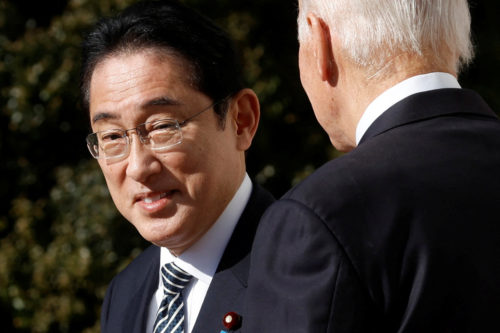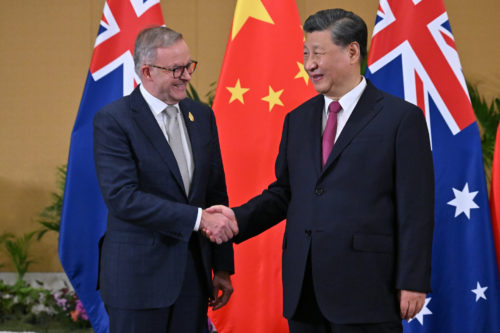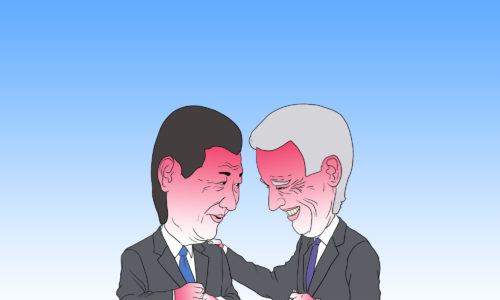On November 25, Chinese President Xí Jìnpíng 习近平 congratulated U.S. President-elect Joe Biden — 18 days after the first networks called the election. But the pair have known each other for more than a decade, since Biden, then vice president, met with his counterpart multiple times as Xi assumed China’s presidency. In fact, Biden’s rise from Delaware’s junior senator to president-elect dovetails with America’s opening and evolving relationship to China since the normalization of relations in 1979.
That history should be helpful when Biden steps into the White House on January 20, as he navigates a particularly fraught moment in the U.S.-China relationship. Axios reported last month that in his final weeks in office, outgoing president Donald Trump intends to push through a set of hardline policies on China that will be difficult for his successor to walk back. Even without new measures, the Biden administration has a full slate of issues to address, from working with China on North Korean denuclearization and the environment to deciding whether to extend tariffs or reenter the Trans-Pacific Partnership.
To see how Biden might move forward, here’s a look back at how he has navigated the U.S.-China relationship over the years.

April 19, 1979
Seven years after Richard Nixon’s historic visit, the U.S. sent its first official Senate delegation to China. In the Great Hall of the People, paramount leader Dèng Xiǎopíng 邓小平 told the American lawmakers that the Taiwan Relations Act, which Biden signed, “undermines the basis for normalization.” Biden, then a second-term senator, broached the subject of installing listening posts in China to monitor Soviet compliance with arms limitation agreements and told Vicki Graham of the Associated Press that Deng “didn’t say a flat no.” China, the senators recounted, wanted to own and control the technology in exchange for sharing information. (Two years later, the New York Times revealed the existence of jointly controlled listening posts in Xinjiang.)
June 22, 1989
After the Chinese government violently suppressed pro-democracy demonstrators in Tiananmen Square and around the country, Biden, chairing a meeting of the Senate Foreign Relations Committee, worried that if the U.S. didn’t send a strong statement to Beijing, it could embolden other communist regimes. “It is clear to me that — that the Chinese never thought there was a need to have a glasnost that went with a perestroika,” he added. “As people gain more control over their economic destiny, even in little increments, it seems to me that that generates a significant instinct, a natural instinct to gain more control over their destiny politically and socially, as well as economically.”
June 10, 1991
With Congress debating suspending China’s most favored nation trade status over the country’s human rights record and weapons proliferation, Biden and other leaders began floating the idea of creating Radio Free China, on the model of Radio Free Europe and Radio Liberty. “The democratic ideal is alive in China, and we should not shrink from encouraging it,” Biden told the Washington Post. (Radio Free Asia launched with Mandarin programming in 1996.)
May 22, 1997
China fired two sets of missiles into the Taiwan Strait in the previous two years, a point that came up during a new round of Senate debates about extending China’s most favored nation trading status. Biden said he supported maintaining the status, but China needed to stop breaking the international agreements it made. “I don’t like the Chinese, or the Chinese government, and the way in which they behave internationally,” he said. “I think it’s shameful. And I guess there’s probably not much we can do about it except we’d better figure out, we’d better come to some kind of deal here, or it’s all going to blow up.”
June 18, 1998
Noting that he has observed the U.S.-China relationship since the Nixon administration, Biden made a case for engagement alongside pressure on human rights. “Engagement can bring about changes we seek in China, but only if we’re both patient and principled,” he said in a Senate hearing. “If we’re swayed…by those who believe that conflict with China is inevitable, as some do, or if we’re lulled into this false sense of security by those who comfortably predict that China’s automatically going to transform itself into this Jeffersonian democracy we assume is all over the world, I think we’re going to miss out on an opportunity to help shape modern China and our own interest.”
August 4, 1999
In the Senate, Biden raised concerns about the Taiwan Security Enhancement Act, which, had it passed, would have increased military ties with Taiwan. “Far from enhancing Taiwan’s security, I’m concerned that passage of this legislation would be the equivalent of waving a red cape in front of Beijing and inviting China to charge,” he said. “Taiwan’s security, in my view, flows from its democratic form of government, its growing economic cultural and political contacts with the mainland, and ultimately the United States’ abiding commitment to a peaceful resolution of the Taiwan question.”
April 15, 2001
Although China joined the World Trade Organization in 2000 with American support, two incidents complicated the relationship: the accidental bombing of the Chinese embassy in Belgrade in 1999 and the 2001 EP-3 incident, in which a U.S. spy plane collided with a Chinese fighter. After the American plane made an emergency landing on Hainan, the plane and crew were taken into Chinese custody and detained for 10 days. “This is a country in transition and a relationship in transition,” Biden said on CBS’s Face the Nation after the Americans were released. “We’re going to go through a lot of these bumps over the next 20 years. And the only question we have to face, it seems to me, is be clear-eyed about what our interests are and act on our interests.”
August 6, 2001
On a Senate trip to Taiwan, South Korea, and China, Biden assured reporters in Taiwan that “we should make sure that Taiwan is never in a position where there is such an imbalance where [China is] able to blackmail, threaten and/or physically dominate,” according to the Associated Press. But he also brushed off concerns about China’s military buildup.
August 10, 2001
Two days after meeting with Chinese President Jiāng Zémín 江泽民, senators visited Yanzikou, a rural village near the Great Wall that is home to an officially sanctioned Catholic church and large Christian population. An AP report from the time recounted Biden left 300 yuan ($46) in the church’s donation box and bought ice pops for local kids. This November, AFP tracked down some of the people Biden met in Yanzikou and revealed that Biden also left 200 yuan ($30) hidden in the home of a family he visited.
April 30, 2007
Biden led a group of 96 senators in sending a letter to Chinese President Hú Jǐntāo 胡锦涛pressing the Chinese government to do more to end the violence in Darfur.
December 14, 2007
During a campaign stop ahead of the Iowa Caucus, Biden, then a presidential candidate, spoke to a voter concerned about outsourcing to China. “China has engaged in trade that is completely unfair,” Biden said, according to an article in Iowa newspaper The Hawk Eye. “The reason we are not doing anything about it is that American corporations have invested millions in China. This administration is choosing China’s interests over our own.”
August 18, 2011
As vice president, Biden went to China to get to know Xi Jinping, then China’s vice president and the presumed successor to Hu. After a meeting at the Great Hall of the People, Biden made an unannounced stop at family-run Beijing restaurant Yao Ji Chaogan near the Drum Tower, ordering the popular noodle dish zhajiang (soybean paste) noodles, pork buns, and cold appetizers. After Biden’s election, the owner fondly recalled the visit in an interview with Phoenix Television, calling him “really affable and friendly.”
August 21, 2011
Biden made headlines for the wrong reasons when, during a Q&A with students at Sichuan University in Chengdu, he said he “understood” and wouldn’t “second guess” China’s one-child policy. His team had to clarify that he did not support forced abortions or sterilizations the Chinese government is accused of using to enforce the policy. The visit had already been off to a rocky start when S&P downgraded the credit rating of U.S. debt right before his arrival and Biden had to assure Chinese leaders of America’s creditworthiness.
December 2, 2013
Ahead of Biden’s visit to China, Japan, and South Korea, China extended its air-defense identification zone in the East China Sea, including the area covering the Senkaku/Diaoyu Islands, claimed by both China and Japan. From Japan, Biden called the move an attempt to “unilaterally change the status quo in the East China Sea.” The U.S. did not recognize the zone, and flew B-52s through the space.
December 4, 2013
In the lobby of a Beijing hotel, Biden shook hands with Jonathan Li, who ran a Chinese investment fund for which Biden’s son Hunter was a board member, according to the New Yorker. During the 2020 campaign season, that meeting was brought up to suggest the younger Biden was inappropriately leveraging his father’s position to further his business interests. Later that day, Biden and Xi met in Beijing for five and a half hours of talks characterized as “tense” by reporters covering the state visit.
June 23, 2015
At the opening of the U.S.-China Strategic & Economic Dialogue, Vice President Biden said the two countries needed to “manage future competition in a responsible way.” He said he supported working with China whenever possible, while also calling on China to protect intellectual property and respect the rule of law. “We do not fear China’s rise,” he added. “We want to see China rise, to continue to rise in a responsible way that will benefit you most, China, because you have an important role to play. A rising China can be a significant asset for the region and the world, and selfishly, for the United States.”
February 25, 2020
In a primary debate, candidate Biden referred to Xi as a “thug” and said China was building concentration camps in Xinjiang and suppressing democracy activists in Hong Kong. The harsher stance was a result of Biden being “reprogrammed” on China, one adviser later told the Economist.
October 22, 2020
In the final presidential debate, Biden brought up intellectual property theft, expansion in the South China Sea, and the need to play by international rules. “We need to be having the rest of our friends with us saying to China these are the rules,” he said. “You play by them or you’re going to pay the price for not playing by them, economically.”
November 13, 2020
Chinese Ministry of Foreign Affairs spokesperson Wāng Wénbīn 汪文斌 offered measured congratulations to Biden and his running mate, Kamala Harris, likely trying to avoid a confrontation with outgoing president Donald Trump, who had not conceded. “We extend congratulations to Mr. Biden and Ms. Harris,” Wang said. “We respect the choice of the American people. Meanwhile we understand the results of the U.S. election will be determined according to U.S. laws and procedures.”







